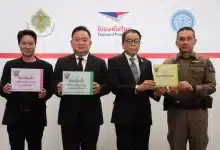Bangkok councillor urges BMA to overhaul special needs education system

In a recent development yesterday, Surajit Pongsingwittaya, a councillor for the Lat Krabang district of Bangkok, put forward a proposal for the Bangkok Metropolitan Administration (BMA) council to enhance the education system. The reservation emphasised the need for tailoring it to accommodate and support children who have special needs.
Surajit, a representative from Pheu Thai Party for the said district, referred to relevant data obtained from the Mental Health Department. He highlighted that there is a concerning number of students, ranging in age from 6 to 15 years, evidently receiving poor grades often plagued with learning difficulties or impairments such as attention deficit hyperactivity or autism.
In Surajit’s view, these students necessitate the attentive supervision of education instructors who have undergone proper training. As it stands, the BMA is responsible for 437 schools, out of which 158 are specifically focused on providing special education. There are 362 specialised staff members serving 4,213 students identified with learning disabilities.
However, Surajit contends that there is a significant shortage of teachers specifically trained in this field – the schools need an additional 340 educators. He added that there is an increasing number of students with learning disabilities who remain unregistered in schools, primarily owing to the limited availability of educational institutions in their vicinity that offer specialised education.
In several instances, these children have never been subjected to a process of evaluation to determine their learning abilities or disabilities. Therefore, when they find themselves studying alongside their average peers in a standard classroom, they are often left lagging further behind.
Surajit vehemently advocated for the institution of a system across each school under the BMA’s purview that can efficiently categorise and monitor students needing special attention. He stated that this aspect should ideally be a mandatory obligation that all 437 schools must fulfil by appointing teachers equipped with the necessary training to assist these students, reported Bangkok Post.
In Surajit’s contemplation, there is an imperative need for a systematic protocol enabling the early identification of children with learning disabilities, preferably as young as when they are enrolled in kindergarten.
The said proposal for special needs education, which received unanimous backing from fellow council members, included the necessity for the BMA to devise a comprehensive plan to adequately remunerate speciality teachers and employ technological means to facilitate the education of children with special needs.
Latest Thailand News
Follow The Thaiger on Google News:


























